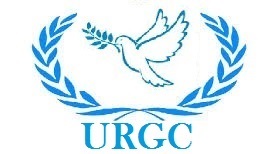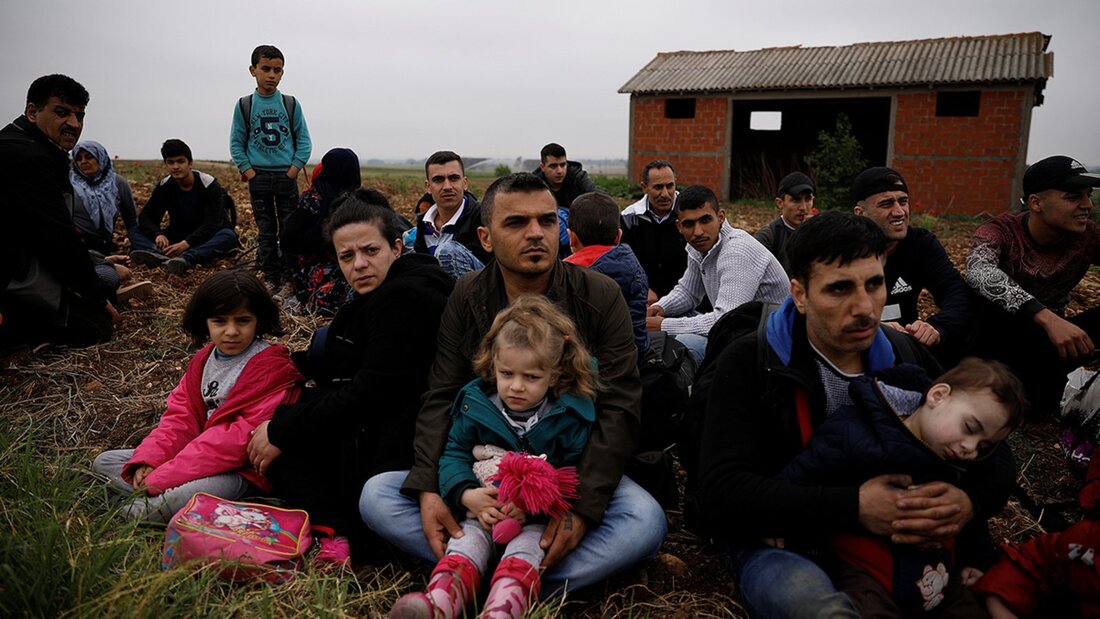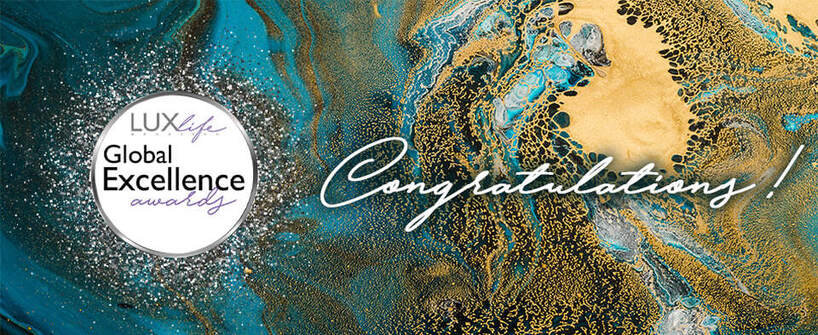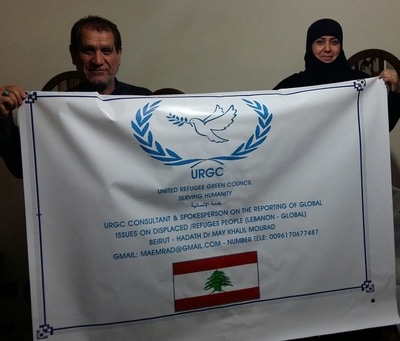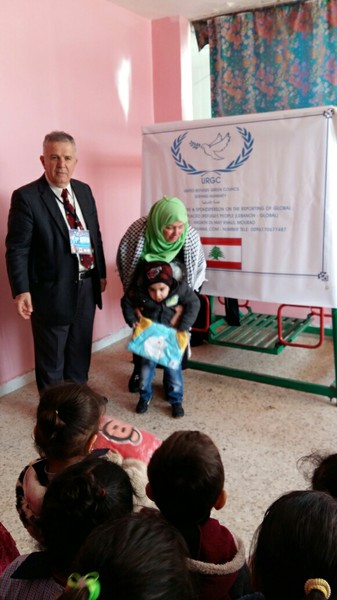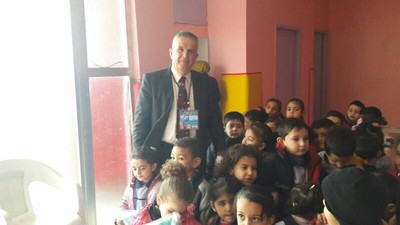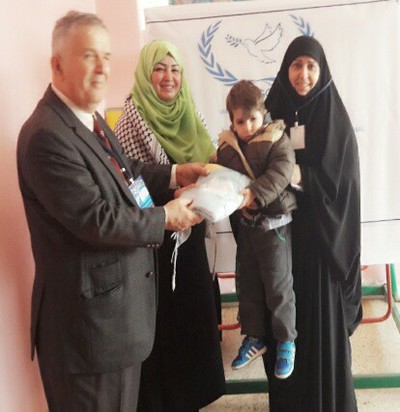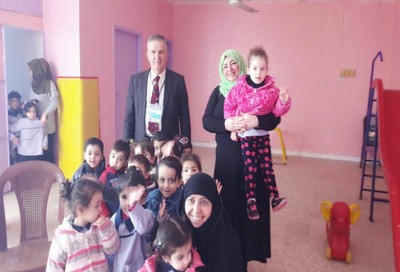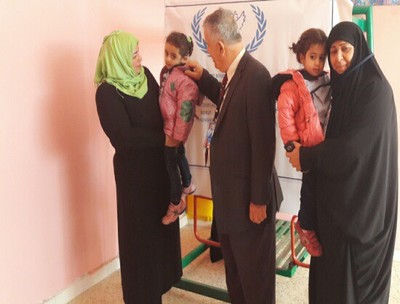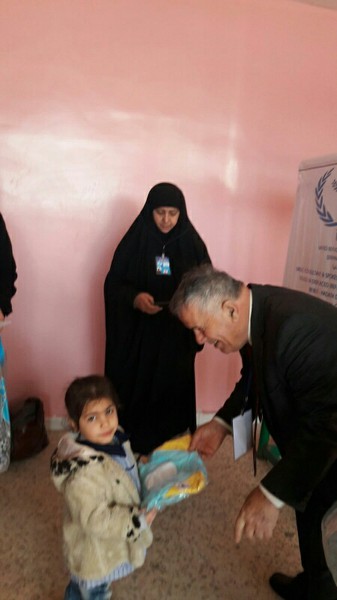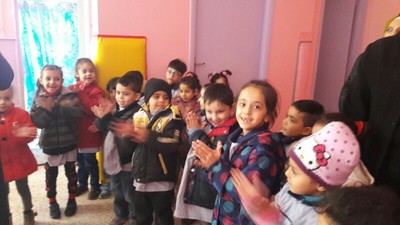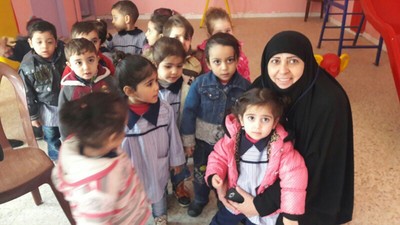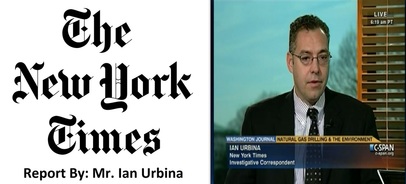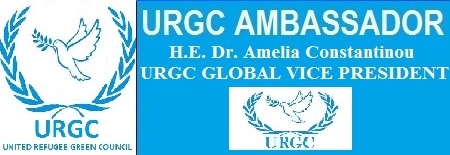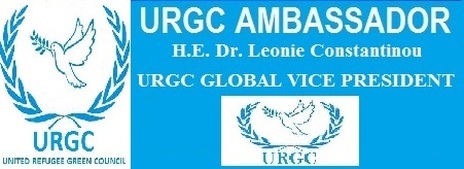|
|
|
URGC NEWS PAGE
URGC URGENT APPEAL
TURKIYE & SYRIA HAS SUFFERED AN EARTHQUAKE WHERE THOUSANDS HAVE BEEN KILLED AND MILLIONS OF PEOPLE HAVE BEEN DISPLACED AND LEFT HOMELESS DURING THIS HARSH WINTER, PLEASE DONATE WHAT YOU CAN TO THE UNITED NATIONS AGENCIES AND TO OTHER AID AGENCIES OF YOUR FREE WILL/CHOICE TO ASSIST THE BEST YOU CAN SO AS TO BRING SOME RELIEF TO THOSE IN NEED.
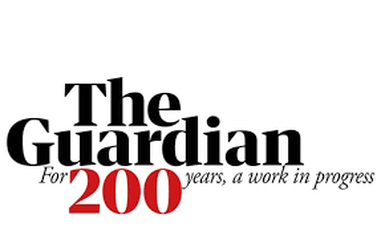
Ukraine’s neighbours bracing for millions of refugees if Russia invades Poland, Romania and Slovakia make plans, as Poland criticised over unequal treatment of asylum seekers
Continue reading - https://www.theguardian.com/world/2022/feb/21/ukraines-neighbours-bracing-for-millions-of-refugees-if-russia-invades
Continue reading - https://www.theguardian.com/world/2022/feb/21/ukraines-neighbours-bracing-for-millions-of-refugees-if-russia-invades

Article/Report by Mr Johannes C. van Nieuwkerk
End of Year Reflection: Reinclusion Instead of Refugee Resettlement & Irregular Migration, a New Geneva Convention?
This year, it has been 70 years since the Geneva Convention on the Status of Refugees was signed. The agreement has helped many and is still very relevant today, particularly its non-refoulement clause which forbids sending people back to unsafe countries. However, the convention has become stretched to its limits, as it was originally only designed to address the aftermath of the Second World War and only with European refugees in mind.
Continue reading - https://refival.medium.com/end-of-year-reflection-reinclusion-instead-of-refugee-resettlement-irregular-migration-a-new-eacc36d5154a
End of Year Reflection: Reinclusion Instead of Refugee Resettlement & Irregular Migration, a New Geneva Convention?
This year, it has been 70 years since the Geneva Convention on the Status of Refugees was signed. The agreement has helped many and is still very relevant today, particularly its non-refoulement clause which forbids sending people back to unsafe countries. However, the convention has become stretched to its limits, as it was originally only designed to address the aftermath of the Second World War and only with European refugees in mind.
Continue reading - https://refival.medium.com/end-of-year-reflection-reinclusion-instead-of-refugee-resettlement-irregular-migration-a-new-eacc36d5154a
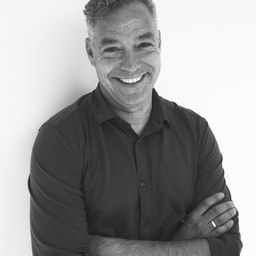
Libya Closed Its Most Notorious Migrant Jail. Is That Good News?
By; Ian Urbina and Joe Galvin
Feb 20
With no explanation from the government, fanfare by aid groups, nor coverage by domestic or foreign media, Libya’s most notorious migrant prison, Al-Mabani, officially closed on January 13, 2022.
In its roughly 12-month lifespan, the prison became emblematic of the unaccountable nature of Libya’s broader detention system. Rape, extortion, and murder in the prison were common and well documented.
Al-Mabani mattered to the world not simply because the U.N. said crimes against humanity were happening there, but also because its existence and growth was the result of EU policies meant to stop migrants from crossing the Mediterranean and reaching European shores.
click here to link to this article
By; Ian Urbina and Joe Galvin
Feb 20
With no explanation from the government, fanfare by aid groups, nor coverage by domestic or foreign media, Libya’s most notorious migrant prison, Al-Mabani, officially closed on January 13, 2022.
In its roughly 12-month lifespan, the prison became emblematic of the unaccountable nature of Libya’s broader detention system. Rape, extortion, and murder in the prison were common and well documented.
Al-Mabani mattered to the world not simply because the U.N. said crimes against humanity were happening there, but also because its existence and growth was the result of EU policies meant to stop migrants from crossing the Mediterranean and reaching European shores.
click here to link to this article
NEWEUROPE
ARITICLE by H.E. URGC Ambassador at Large Lena DEros https://www.neweurope.eu/article/refugees-a-global-unresolved-problem/
|
ARTICLE BY; Ian Urbina of New York Times - What was the impact of our exposé on Europe’s shadow immigration system? |
In the weeks since the publication of The Outlaw Ocean Project’s investigation of the European Union's support for the brutal capture and detention of refugees in Libya, the already heated debate about migration to Europe from Africa and the Middle East broke out anew among politicians, religious leaders, human rights advocates, and legislators.
A variety of those public figures cited the damning findings of the investigation to make the point that wealthier countries such as the United States and the member states of the E.U. have to find a better plan for dealing with the even greater numbers of people across the globe who will be forced to flee their homelands because of climate change. Merely outsourcing immigration enforcement to troubled states like Mexico or Libya is hardly a humane or effective answer.
In Greece, Pope Francis condemned Europe’s policies of "self-interest and nationalism," that he said had led to a wholesale mistreatment of innocent migrants so vast it represented nothing less than the "shipwreck of civilization." Describing our investigation as a “must read,” Mohamed ElBaradei, a Nobel Peace Prize winner and former vice president of Egypt, added, “No wonder most western official rhetoric on ‘human rights’ is not taken seriously."
The investigation, co-published with the New Yorker magazine, detailed the enormous human toll of Europe’s decision to finance a far-reaching crackdown on migrants conducted by the authorities in Libya, one of the most popular transit countries for desperate people heading to Europe, most of them fleeing poverty, violence and the damaging impact of an overheating planet.
The E.U. has for years sent money and equipment to Libya’s corrupt and brutal Coast Guard to catch migrants before they reach Europe, while effectively turning a blind eye to the ghastly conditions inside Libyan detention centers. The array of notorious militias that run these prisons have tortured, extorted and killed migrants in their custody, including a young farmer and father of three from Guinea-Bissau named Aliou Candé, whose death was at the center of our investigation.
The week that our reporting was published, a coalition of human rights lawyers in Europe formally submitted a written complaint to the International Criminal Court requesting that it open an investigation into the E.U's cynical and deadly partnership with Libya. Two female migrants filed a separate legal complaint with the United Nations alleging that they had been, with the E.U.’s tacit blessing, subjected to arbitrary detention and torture in Libya.
Meanwhile in the days after our investigation was published, the Libyan Foreign Minister said that her country was tired of doing Europe’s bidding in limiting migration to the E.U. – an arrangement she said had resulted in Libya being portrayed as an ugly and violent tool in a geopolitical crisis. “Please do not push the problem in our lap and please do not point your fingers at Libya and portray us as a country which abuses and disrespects refugees,” said the minister, Najla Mangoush. She added that years of European money sent to bolster Libya’s migration enforcement actions had simply served what she called, "the agenda of the E.U."
A central focus of our investigation – the controversial role of Europe’s multi-billion-dollar border protection agency, Frontex – also became the subject of fresh scrutiny. The Frontex official in charge of protecting the rights of migrants said he was alarmed and frustrated by what he cited as the border agency’s disregard for evidence of harm committed against migrants. This criticism echoed similar claims included in our reporting from a different senior Frontex official who had said that the disregard for violence against migrants had existed within the agency’s top ranks for years.
French President Emmanuel Macron, on the other hand, called for Frontex to be granted emergency powers as he argued that Europe's future depended on its ability to control its borders. His comments came two days after more than two dozen migrants drowned during an attempted crossing of the English Channel.
A variety of those public figures cited the damning findings of the investigation to make the point that wealthier countries such as the United States and the member states of the E.U. have to find a better plan for dealing with the even greater numbers of people across the globe who will be forced to flee their homelands because of climate change. Merely outsourcing immigration enforcement to troubled states like Mexico or Libya is hardly a humane or effective answer.
In Greece, Pope Francis condemned Europe’s policies of "self-interest and nationalism," that he said had led to a wholesale mistreatment of innocent migrants so vast it represented nothing less than the "shipwreck of civilization." Describing our investigation as a “must read,” Mohamed ElBaradei, a Nobel Peace Prize winner and former vice president of Egypt, added, “No wonder most western official rhetoric on ‘human rights’ is not taken seriously."
The investigation, co-published with the New Yorker magazine, detailed the enormous human toll of Europe’s decision to finance a far-reaching crackdown on migrants conducted by the authorities in Libya, one of the most popular transit countries for desperate people heading to Europe, most of them fleeing poverty, violence and the damaging impact of an overheating planet.
The E.U. has for years sent money and equipment to Libya’s corrupt and brutal Coast Guard to catch migrants before they reach Europe, while effectively turning a blind eye to the ghastly conditions inside Libyan detention centers. The array of notorious militias that run these prisons have tortured, extorted and killed migrants in their custody, including a young farmer and father of three from Guinea-Bissau named Aliou Candé, whose death was at the center of our investigation.
The week that our reporting was published, a coalition of human rights lawyers in Europe formally submitted a written complaint to the International Criminal Court requesting that it open an investigation into the E.U's cynical and deadly partnership with Libya. Two female migrants filed a separate legal complaint with the United Nations alleging that they had been, with the E.U.’s tacit blessing, subjected to arbitrary detention and torture in Libya.
Meanwhile in the days after our investigation was published, the Libyan Foreign Minister said that her country was tired of doing Europe’s bidding in limiting migration to the E.U. – an arrangement she said had resulted in Libya being portrayed as an ugly and violent tool in a geopolitical crisis. “Please do not push the problem in our lap and please do not point your fingers at Libya and portray us as a country which abuses and disrespects refugees,” said the minister, Najla Mangoush. She added that years of European money sent to bolster Libya’s migration enforcement actions had simply served what she called, "the agenda of the E.U."
A central focus of our investigation – the controversial role of Europe’s multi-billion-dollar border protection agency, Frontex – also became the subject of fresh scrutiny. The Frontex official in charge of protecting the rights of migrants said he was alarmed and frustrated by what he cited as the border agency’s disregard for evidence of harm committed against migrants. This criticism echoed similar claims included in our reporting from a different senior Frontex official who had said that the disregard for violence against migrants had existed within the agency’s top ranks for years.
French President Emmanuel Macron, on the other hand, called for Frontex to be granted emergency powers as he argued that Europe's future depended on its ability to control its borders. His comments came two days after more than two dozen migrants drowned during an attempted crossing of the English Channel.
Bigger Audience, Broader Question
The investigation originally appeared as a 10,000-word story in the New Yorker. It was then followed by a half-dozen shorter follow-up stories, including a deeper look at Frontex and a fuller discussion of the looming specter of increased climate migration. The reporting had unusual global reach due to the unique way it was published, running ultimately in 11 languages, 26 countries and 53 magazine, radio, television and newspaper outlets.
The investigation included a 27-minute documentary film, published originally with The Guardian and subsequently with a half dozen other outlets. The film derived from reporting done by Ed Ou during a 5-week embed on a Doctor’s Without Borders ship conducting migrant rescues on the Mediterranean. Among the documentary film’s accomplishments, Ou captured on camera, possibly for the first time, the use of drones by Frontex to locate migrant boats – the coordinates of which, it was discovered, are then handed over to the Libyan Coast Guard.
A variety of television outlets, including CNN, MSNBC, Al-Jazeera and NBC, ran pieces about the investigation’s revelations. The LA Times, The Christian Science Monitor, Al Jazeera and other news venues published versions of an opinion piece on the role of climate change. In addition to National Public Radio in the U.S., radio stations from Guinea-Bissau to Belarus, The Netherlands and Germany produced their own pieces, sometimes using audio elements from our reporting in Libya.
Art also played a distinct and important role in disseminating the journalism. The reporting was put on stage in front of sold-out audiences in Oakland, Los Angeles, New York and Washington D.C. for a theatrical rendering by a company called Pop-Up Magazine. An electronic musician named Adam Noya paired music and samples from an audio version of the written story, hoping to get the reporting to his listeners using non-news platforms like Spotify and Apple Music. Three graphic designers – Russell Gonsalves, Edward Distarce, and Clay Rodery – spent weeks creating animated versions of the investigation to offer a different way to experience the dramatic narrative.
Broadly speaking, there were three goals in melding journalism with art. The first was to use digital platforms that are not typically employed for news reporting. The second was to reach a younger and more global audience. The third was to access people more creatively, viscerally and emotionally.
As much as our investigation solved certain mysteries, it also raised a larger and vexing question: how can countries more humanely handle migration? The stakes of this question are only going to grow considering that demographers predict that more than 150 million people will seek to relocate due to the climate crisis over the next 50 years.
Migration experts and human rights advocates offered a variety of insights for ways to improve the handling of the Mediterranean crisis. Partly to discuss some of the investigation’s findings, the Libyan American Alliance hosted an online roundtable discussion about Libya and migration. During the event, Thomas Garofalo, Libyan Country Director for the International Rescue Committee, said that the E.U. needs to stop partnering with the Libyans on migration control. “There really has to be a return to a European search and rescue in the Mediterranean,” he said. “It is clear that the Libyan Coast Guard is not able to protect the lives and the welfare of these people trying to cross.”
Ahmed Gasir, a researcher for a Libyan NGO, Human Rights Solidarity, added that the United Nations should immediately restore its evacuation flights from Tripoli, which, until they were canceled over a year ago, were one of the only safe ways for migrants to escape Libya. More than 40,000 refugees are stuck in Libya and these are the ones not even in the brutal detention centers, he said.
Mark Micaleff, a Libya expert with the Global Initiative Against Transnational Organized Crime, said that it would not be wise or ethical to pull E.U. money from the many aid organizations doing life-saving work with migrants in Libya. He added that E.U. officials might not have much control over what happens in the migrant prisons in Libya. But they could apply more pressure on the Libyan government by tying further financial support for the Libyan Coast Guard to demonstrable improvements in these prisons.
Several other sources made a higher-altitude point: building taller and thicker walls like the invisible one that the E.U. has erected across the Mediterranean is not the way to respond to the global stampede that climate migration has set in motion. The more sustainable solution is to direct resources and policy attention toward the push factors that are driving desperate people to surge toward Europe and the U.S.
The investigation originally appeared as a 10,000-word story in the New Yorker. It was then followed by a half-dozen shorter follow-up stories, including a deeper look at Frontex and a fuller discussion of the looming specter of increased climate migration. The reporting had unusual global reach due to the unique way it was published, running ultimately in 11 languages, 26 countries and 53 magazine, radio, television and newspaper outlets.
The investigation included a 27-minute documentary film, published originally with The Guardian and subsequently with a half dozen other outlets. The film derived from reporting done by Ed Ou during a 5-week embed on a Doctor’s Without Borders ship conducting migrant rescues on the Mediterranean. Among the documentary film’s accomplishments, Ou captured on camera, possibly for the first time, the use of drones by Frontex to locate migrant boats – the coordinates of which, it was discovered, are then handed over to the Libyan Coast Guard.
A variety of television outlets, including CNN, MSNBC, Al-Jazeera and NBC, ran pieces about the investigation’s revelations. The LA Times, The Christian Science Monitor, Al Jazeera and other news venues published versions of an opinion piece on the role of climate change. In addition to National Public Radio in the U.S., radio stations from Guinea-Bissau to Belarus, The Netherlands and Germany produced their own pieces, sometimes using audio elements from our reporting in Libya.
Art also played a distinct and important role in disseminating the journalism. The reporting was put on stage in front of sold-out audiences in Oakland, Los Angeles, New York and Washington D.C. for a theatrical rendering by a company called Pop-Up Magazine. An electronic musician named Adam Noya paired music and samples from an audio version of the written story, hoping to get the reporting to his listeners using non-news platforms like Spotify and Apple Music. Three graphic designers – Russell Gonsalves, Edward Distarce, and Clay Rodery – spent weeks creating animated versions of the investigation to offer a different way to experience the dramatic narrative.
Broadly speaking, there were three goals in melding journalism with art. The first was to use digital platforms that are not typically employed for news reporting. The second was to reach a younger and more global audience. The third was to access people more creatively, viscerally and emotionally.
As much as our investigation solved certain mysteries, it also raised a larger and vexing question: how can countries more humanely handle migration? The stakes of this question are only going to grow considering that demographers predict that more than 150 million people will seek to relocate due to the climate crisis over the next 50 years.
Migration experts and human rights advocates offered a variety of insights for ways to improve the handling of the Mediterranean crisis. Partly to discuss some of the investigation’s findings, the Libyan American Alliance hosted an online roundtable discussion about Libya and migration. During the event, Thomas Garofalo, Libyan Country Director for the International Rescue Committee, said that the E.U. needs to stop partnering with the Libyans on migration control. “There really has to be a return to a European search and rescue in the Mediterranean,” he said. “It is clear that the Libyan Coast Guard is not able to protect the lives and the welfare of these people trying to cross.”
Ahmed Gasir, a researcher for a Libyan NGO, Human Rights Solidarity, added that the United Nations should immediately restore its evacuation flights from Tripoli, which, until they were canceled over a year ago, were one of the only safe ways for migrants to escape Libya. More than 40,000 refugees are stuck in Libya and these are the ones not even in the brutal detention centers, he said.
Mark Micaleff, a Libya expert with the Global Initiative Against Transnational Organized Crime, said that it would not be wise or ethical to pull E.U. money from the many aid organizations doing life-saving work with migrants in Libya. He added that E.U. officials might not have much control over what happens in the migrant prisons in Libya. But they could apply more pressure on the Libyan government by tying further financial support for the Libyan Coast Guard to demonstrable improvements in these prisons.
Several other sources made a higher-altitude point: building taller and thicker walls like the invisible one that the E.U. has erected across the Mediterranean is not the way to respond to the global stampede that climate migration has set in motion. The more sustainable solution is to direct resources and policy attention toward the push factors that are driving desperate people to surge toward Europe and the U.S.
Europe’s Denial
For far too long European officials have claimed that their role in Libya was strictly humanitarian. These officials said that the EU does not pay for anything associated with the illegal capture and brutalizing of refugees in Libya. The investigation showed that this claim was untrue. By using a database of E.U. contracts and other sources, we found millions of dollars worth of purchases – ranging from the buses used to transport captured migrants from port to prisons, to the SUVs deployed to hunt refugees in the deserts, to the body bags used to bury the fallen. By scouring footage and still images on social media, we pinned down how these purchases were being used by militias, aid groups and the government in Libya.
In reaction, Jeff Crisp, the former head of policy development and evaluation at the office of the United Nations High Commissioner for Refugees, tweeted that the investigation was "probably the most detailed report so far on the EU-supported programme that allows the Libyan Coast Guard and associated militia groups to intercept refugees at sea." Ali Noorani, the CEO of the National Immigration Forum, added that the reporting brought "the cruelty and depravity of this approach to migration to entirely new levels."
Referencing the investigation, Othmar Karas, a parliamentarian from Austria, wrote the European Commission, asking it to investigate the “prison-like facilities where refugees and migrants are detained” at the E.U.’s behest. “What measures is the Commission taking to put an end to the human rights situation in the prison-like facilities for migrants and refugees in Libya?” he wrote.
Ciarán Cuffe, another E.U. parliamentarian from Ireland, also wrote the Commission citing specific purchases that our investigation revealed by the E.U. on behalf of the Libyan Coast Guard, including several soon-to-be-delivered P150 class patrol boats. He asked what actions the E.U. plans to take to ensure that such assets are not used to push migrants back to Libya in contravention of international law. On December 10, Fabio Castaldo, a lawmaker from Italy who is also the European Parliament's vice president, said that Europe to date had failed to come together to pursue a set of immigration policies that were both effective and humane. A collective effort would need to put the "dignity" of migrants at the forefront, he said.
Father Mussie Zerai, an Eritrean Catholic priest and one-time nominee for the Nobel Peace Prize, echoed that sentiment in a letter sent to the Parliament's president, David Sassoli. Zerai said in the letter that the first step toward what he called a "radical revision" of the E.U.'s work with Libya would require "a decisive warning to Libya to put an end to the violence and call those responsible to answer for it."
In testimony before a United States House of Representatives committee in late December, an official with the United States Agency for International Development said that America had a strategic interest in a stable Libya, and cited our reporting to argue that the humane treatment of migrants would be required for the country to reclaim its legitimacy.
What Lies Ahead
Where does this story go from here? It’s hard to say. Earlier this year, for the first time ever, two cases brought by migrants alleging complicity in abuse by Frontex and its personnel have reached the Court of Justice for the European Union.
Migrant advocates hailed a ruling last week by Italy’s Supreme Court overturning the conviction of two migrants who Italian authorities had accused of defying their efforts to return them to Libya. The high court’s ruling said the migrants, having been rescued at sea by tugboat operators, were within their rights to resist being sent back to a country that does not meet the international standard for a safe port.
The lawyers for the migrants said the ruling makes clear that “rescue operations at sea which result in the return of survivors to Libya constitute a breach of the principle of non-refoulement and violate the rights of the people rescued who should be taken to a place of safety where their lives are no longer in danger and respect of their fundamental rights is guaranteed.”
It is unclear what will become of the most recent legal actions taken against the E.U., both before the International Criminal Court and the United Nations, but the filings have become part of a broader challenge to the legality of the E.U.’s policies and the conduct of its border agency, Frontex.
Tineke Strik, a Dutch member of the European Parliament, said she intended to hold a hearing before the parliamentary subcommittee on Human Rights in January so that the reporters behind the investigation could give public testimony concerning the E.U.'s involvement with Libya. Other government officials from Dublin to Istanbul issued public calls for rethinking Europe's approach to managing the migrant crisis.
The Quieter Wins
Sometimes the small and personal victories in journalism are the most satisfying. Our reporting in Libya included successfully launching a drone over the migrant prison in Tripoli where the migrant from Guinea-Bissau was killed. It was a dangerous journalistic endeavor, but it seemed worth the risk for the sake of showing a dark and violent place that had long been hidden, even to people who lived right next door.
In the end, the drone footage from above paired with cellphone videos secreted out from inside the prison, known as Al Mabani, became the iconic representation of a harsh truth that was broadcast not just in Europe and the U.S. but also and importantly in news outlets in Algeria, Libya, Morocco, Tunisia, and Turkey.
We made a special effort to ensure that the story ran extensively in Arabic and other languages in the Middle East and throughout Africa. This seemed like a distinctly worthy accomplishment because such reporting rarely gets published in the very places where the people most impacted live.
While reporting on the story in Tripoli, several reporters conducting the investigation were violently taken captive and disappeared into a secret prison by the Libyan Intelligence Service, long affiliated with one of Libya’s powerful militias, the Al Nawasi brigade. Shortly after the publication of the investigation, the Libyan Intelligence Service handed over to the U.S. State Department the $30,000 worth of equipment and personal belongings they had seized from the reporters before releasing them after six days in captivity.
After Aliou Candé was killed by a guard at Al Mabani, police initially listed him in paperwork without a name. This fact added insult to injury for Candé’s great uncle who visited the police station to identify his body. One of our investigation’s humbler aspirations was to re-humanize Candé by telling his story to the world in a way that the global public might understand him as a person, not as a tragic statistic. Only readers can be the judge of whether the work succeeded at this goal. At minimum, though, we do know that the hashtag #AliouCande went viral and the link to the story was seen by more than 13 million people on Twitter alone.
Aliou Candé’s name is surely now known. So too is the E.U.’s role in his abuse and death.
For far too long European officials have claimed that their role in Libya was strictly humanitarian. These officials said that the EU does not pay for anything associated with the illegal capture and brutalizing of refugees in Libya. The investigation showed that this claim was untrue. By using a database of E.U. contracts and other sources, we found millions of dollars worth of purchases – ranging from the buses used to transport captured migrants from port to prisons, to the SUVs deployed to hunt refugees in the deserts, to the body bags used to bury the fallen. By scouring footage and still images on social media, we pinned down how these purchases were being used by militias, aid groups and the government in Libya.
In reaction, Jeff Crisp, the former head of policy development and evaluation at the office of the United Nations High Commissioner for Refugees, tweeted that the investigation was "probably the most detailed report so far on the EU-supported programme that allows the Libyan Coast Guard and associated militia groups to intercept refugees at sea." Ali Noorani, the CEO of the National Immigration Forum, added that the reporting brought "the cruelty and depravity of this approach to migration to entirely new levels."
Referencing the investigation, Othmar Karas, a parliamentarian from Austria, wrote the European Commission, asking it to investigate the “prison-like facilities where refugees and migrants are detained” at the E.U.’s behest. “What measures is the Commission taking to put an end to the human rights situation in the prison-like facilities for migrants and refugees in Libya?” he wrote.
Ciarán Cuffe, another E.U. parliamentarian from Ireland, also wrote the Commission citing specific purchases that our investigation revealed by the E.U. on behalf of the Libyan Coast Guard, including several soon-to-be-delivered P150 class patrol boats. He asked what actions the E.U. plans to take to ensure that such assets are not used to push migrants back to Libya in contravention of international law. On December 10, Fabio Castaldo, a lawmaker from Italy who is also the European Parliament's vice president, said that Europe to date had failed to come together to pursue a set of immigration policies that were both effective and humane. A collective effort would need to put the "dignity" of migrants at the forefront, he said.
Father Mussie Zerai, an Eritrean Catholic priest and one-time nominee for the Nobel Peace Prize, echoed that sentiment in a letter sent to the Parliament's president, David Sassoli. Zerai said in the letter that the first step toward what he called a "radical revision" of the E.U.'s work with Libya would require "a decisive warning to Libya to put an end to the violence and call those responsible to answer for it."
In testimony before a United States House of Representatives committee in late December, an official with the United States Agency for International Development said that America had a strategic interest in a stable Libya, and cited our reporting to argue that the humane treatment of migrants would be required for the country to reclaim its legitimacy.
What Lies Ahead
Where does this story go from here? It’s hard to say. Earlier this year, for the first time ever, two cases brought by migrants alleging complicity in abuse by Frontex and its personnel have reached the Court of Justice for the European Union.
Migrant advocates hailed a ruling last week by Italy’s Supreme Court overturning the conviction of two migrants who Italian authorities had accused of defying their efforts to return them to Libya. The high court’s ruling said the migrants, having been rescued at sea by tugboat operators, were within their rights to resist being sent back to a country that does not meet the international standard for a safe port.
The lawyers for the migrants said the ruling makes clear that “rescue operations at sea which result in the return of survivors to Libya constitute a breach of the principle of non-refoulement and violate the rights of the people rescued who should be taken to a place of safety where their lives are no longer in danger and respect of their fundamental rights is guaranteed.”
It is unclear what will become of the most recent legal actions taken against the E.U., both before the International Criminal Court and the United Nations, but the filings have become part of a broader challenge to the legality of the E.U.’s policies and the conduct of its border agency, Frontex.
Tineke Strik, a Dutch member of the European Parliament, said she intended to hold a hearing before the parliamentary subcommittee on Human Rights in January so that the reporters behind the investigation could give public testimony concerning the E.U.'s involvement with Libya. Other government officials from Dublin to Istanbul issued public calls for rethinking Europe's approach to managing the migrant crisis.
The Quieter Wins
Sometimes the small and personal victories in journalism are the most satisfying. Our reporting in Libya included successfully launching a drone over the migrant prison in Tripoli where the migrant from Guinea-Bissau was killed. It was a dangerous journalistic endeavor, but it seemed worth the risk for the sake of showing a dark and violent place that had long been hidden, even to people who lived right next door.
In the end, the drone footage from above paired with cellphone videos secreted out from inside the prison, known as Al Mabani, became the iconic representation of a harsh truth that was broadcast not just in Europe and the U.S. but also and importantly in news outlets in Algeria, Libya, Morocco, Tunisia, and Turkey.
We made a special effort to ensure that the story ran extensively in Arabic and other languages in the Middle East and throughout Africa. This seemed like a distinctly worthy accomplishment because such reporting rarely gets published in the very places where the people most impacted live.
While reporting on the story in Tripoli, several reporters conducting the investigation were violently taken captive and disappeared into a secret prison by the Libyan Intelligence Service, long affiliated with one of Libya’s powerful militias, the Al Nawasi brigade. Shortly after the publication of the investigation, the Libyan Intelligence Service handed over to the U.S. State Department the $30,000 worth of equipment and personal belongings they had seized from the reporters before releasing them after six days in captivity.
After Aliou Candé was killed by a guard at Al Mabani, police initially listed him in paperwork without a name. This fact added insult to injury for Candé’s great uncle who visited the police station to identify his body. One of our investigation’s humbler aspirations was to re-humanize Candé by telling his story to the world in a way that the global public might understand him as a person, not as a tragic statistic. Only readers can be the judge of whether the work succeeded at this goal. At minimum, though, we do know that the hashtag #AliouCande went viral and the link to the story was seen by more than 13 million people on Twitter alone.
Aliou Candé’s name is surely now known. So too is the E.U.’s role in his abuse and death.
|
ARTICLE BY Ian Urbina of New York Times (full article https://www.newyorker.com/magazine/2021/12/06/the-secretive-libyan-prisons-that-keep-migrants-out-of-europe)
Captivity and Crimes Against Humanity in Libya There are two reasons that the story we are publishing today is unusually important to us at The Outlaw Ocean Project. Captivity and Crimes Against Humanity in Libya |
he first reason is the lengths that we went through to land this piece of journalism. While reporting in Libya, our team was taken captive and disappeared into a secret prison run by a militia. The team was held incommunicado for a week. One of us was severely beaten resulting in two broken ribs, blood in urine and kidney damage. And though the experience was brutal, it pales in comparison to the abuses visited on the migrants held in that country's E.U.-funded gulags.
The second reason is the urgency of the topic. Few subjects are more pressing than how the developed world plans to handle the growing waves of desperate people trying to escape the calamities of climate change.
This story is being published simultaneously on our website and in The New Yorker magazine. Over the next several weeks, the results of this year-long investigation will also be published in various languages internationally in several dozen outlets.
This story is being published simultaneously on our website and in The New Yorker magazine. Over the next several weeks, the results of this year-long investigation will also be published in various languages internationally in several dozen outlets.
ANNOUCEMENT -
THE VASSILI GROUP LTD HAS BEEN OFFERED A GRANT/ENDOWMENT TO BE PLACED WITHIN THE URGC, SO AS TO HELP DEVELOP THE URGC
The URGC is founded and developed by Sir Chrysostomos Vassili Director of the Vassili Group Ltd acting as and on behalf of the Vassili Group Ltd. The Vassili Group Ltd has administered and managed the URGC on a voluntary basis since its formation.
The Vassili Group Ltd is being offered a Grant/Endowment to help further Develop the URGC, so that it can have a more physical impact in serving humanity in the development of human welfare and by assisting existing other Aid agencies achieve the same.
If this Grant/Endowment is granted to the Vassili Group Ltd, the Vassili Group Ltd will Grant/Endow the same to the URGC. This will create a new structure for the URGC, one that can have a direct physical impact on helping increase life chances and quality of life to millions of displaced people and refugees globally.
We will keep all updated on any progress relating to this.
Hi Chrysostomos,
I hope this email finds you safe and well.
I am writing to inform you that the results of our annual Global Excellence Awards, proudly hosted by LUX Life Magazine, have now been decided.
I am delighted to say it's great news! URGC has been awarded;
Best Global Humanitarian Organisation - Cyprus
I hope that in the midst of everything this news is well received, and marks the start of a hopefully less turbulent time! URGC, like all our winners, has demonstrated excellence, commitment, dedication even in the face of uncertainty. After overcoming such disruption, we believe more than ever, that you should be recognised!
Our Selection Process
Following your nomination acceptance, you were added to our shortlist and became subject to LUX Life's rigorous internal vetting procedure. Our extensive research and judging process is driven by merit and centred around an in-depth evaluation of skills and services on offer.
Awardees must demonstrate expertise within their field, dedication to customer service and a commitment to promoting excellence. This approach has brought us much success and commendation throughout its use and enforces LUX Life's stance that victors are not determined by popularity of votes, but by their contributions to their industry.
Holly Morris | Awards Executive | LUX Life Magazine
Available: Office hours Monday through Friday 9am – 5:30pm GMT
Tel: +44 (0)20 3970 0028
Address: 2nd Floor, Suite F, The Maltsters, 1-2 Wetmore Road, Burton-on-Trent, Staffordshire, DE14 1LS
Registered Company Number: 07400916 | ICO Registration: ZA269476
I hope this email finds you safe and well.
I am writing to inform you that the results of our annual Global Excellence Awards, proudly hosted by LUX Life Magazine, have now been decided.
I am delighted to say it's great news! URGC has been awarded;
Best Global Humanitarian Organisation - Cyprus
I hope that in the midst of everything this news is well received, and marks the start of a hopefully less turbulent time! URGC, like all our winners, has demonstrated excellence, commitment, dedication even in the face of uncertainty. After overcoming such disruption, we believe more than ever, that you should be recognised!
Our Selection Process
Following your nomination acceptance, you were added to our shortlist and became subject to LUX Life's rigorous internal vetting procedure. Our extensive research and judging process is driven by merit and centred around an in-depth evaluation of skills and services on offer.
Awardees must demonstrate expertise within their field, dedication to customer service and a commitment to promoting excellence. This approach has brought us much success and commendation throughout its use and enforces LUX Life's stance that victors are not determined by popularity of votes, but by their contributions to their industry.
Holly Morris | Awards Executive | LUX Life Magazine
Available: Office hours Monday through Friday 9am – 5:30pm GMT
Tel: +44 (0)20 3970 0028
Address: 2nd Floor, Suite F, The Maltsters, 1-2 Wetmore Road, Burton-on-Trent, Staffordshire, DE14 1LS
Registered Company Number: 07400916 | ICO Registration: ZA269476
RePUblic of cyprus grapples with highest number of asylum seekers per capita in EU
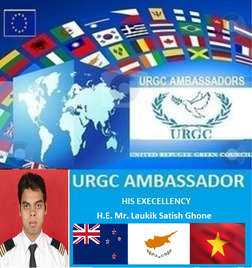
Cyprus is the European state that hosts the largest number of refugees proportionally: 13,259 out of a total of 850,000 inhabitants, about 4% of the total population. Numbers are constantly increasing, with a year-over-year 50% increase in the migratory flow in 2017 compared to 2016 and 69% in 2018 and today in 2021 it has increased even further.
A URGC Ambassador At Large H.E. Captain Laukik Satish Ghone is in the process of raising funds to invest in affordable public social housing and housing for refugees in the Republic of Cyprus so as to help bring relief in the housing crisis of refugees within Cyprus
His Excellency plans to visit Cyprus sometime within March 2022 to meet with the Vassili Group, Limassol, Cyprus, who he is partnered with, and then the Cyprus Refugee Council so as to discuss proposals for assistance in helping to bring relief to the Cyprus Refugee Council and refugees in investing in social housing to house dominantly refugee families.
A URGC Ambassador At Large H.E. Captain Laukik Satish Ghone is in the process of raising funds to invest in affordable public social housing and housing for refugees in the Republic of Cyprus so as to help bring relief in the housing crisis of refugees within Cyprus
His Excellency plans to visit Cyprus sometime within March 2022 to meet with the Vassili Group, Limassol, Cyprus, who he is partnered with, and then the Cyprus Refugee Council so as to discuss proposals for assistance in helping to bring relief to the Cyprus Refugee Council and refugees in investing in social housing to house dominantly refugee families.
URGC 2017-2020 HUMANITERIAN EFFORTS OF URGC AMBASSADOR H.E Dr May Mourad,
SYRIAN REFUGEE CHILDREN IN LEBANON, RECEIVING, CLOTHING, SHOES, EDUCATIONAL MATERIALS & FOOD
Public Notice 1: URGC is not connected to any Government, political party, nor is it a Government Agency, UN Agency or European Commission Agency or connected to any Religious body or organization other than its founder. Any mention of such Agencies in this website is only in reference to our lobbying and mission.
Public Notice 2: URGC does not sell any product or membership or service to the public or any organization, nor requests any public or corporate donations, URGC has no facility to receive public money/funds, so please do not offer funding or donation to URGC. If you wish to make donations please do so directly to the UN aid agencies, Red Cross or other reputable aid charities of your own free choice.
Public Notice 3: URGC is a neutral organisation without borders, made up of international honorable volunteers who apply their own time, views, consultation, and actions to help reduce human suffering and help aid humanity via the actions and ability of each individual URGC Ambassador and URGC Goodwill Ambassador.
Public Notice 4: The URGC website is operated and administered by the Vassili Group and URGC Volunteers, who act within their own time and without pay for the greater good of humanity.
Public Notice 5: Notification upon this website will be made If any future structural changes to the URGC was to be decided upon.
Managed: The URGC was born from the ethos and virtuous actions of Sir Chrysostomos Vassili, T/A Vassili Group, and it is 100% managed and fully operated by volunteers.
URGC Founded in 2011 by H.E. Sir Chrysostomos Vassili, CEO of Vassili Group LLC
